Waste not, want not: crafting shoes sustainably
As shoes are notoriously difficult to recycle, designer Helen Kirkum began transforming pairs destined for landfill into a joyful mishmash of colours, textures and materials, formed entirely of post-consumer waste.


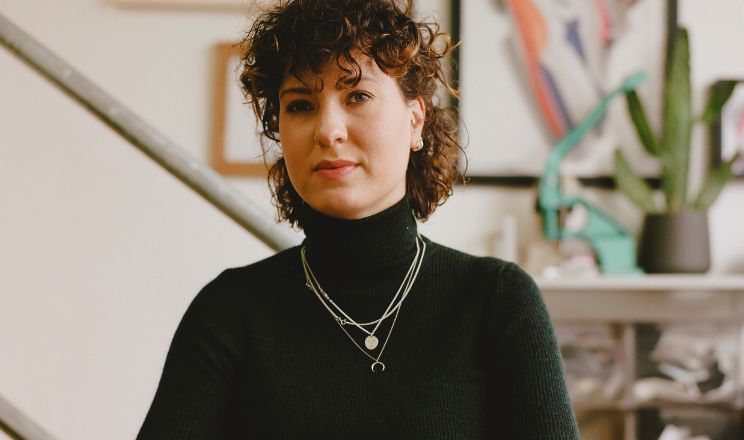
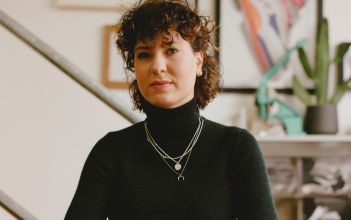
Helen Kirkum Studio has been reimagining and reconfiguring the British footwear industry since early 2019. Focusing on post-consumer waste (worn items perceived as being at the end of their ‘life’), Helen and her team breathe new life into discarded footwear – splicing, sewing and chopping to create an entirely new and unique pair of shoes each time.
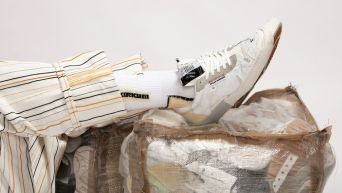
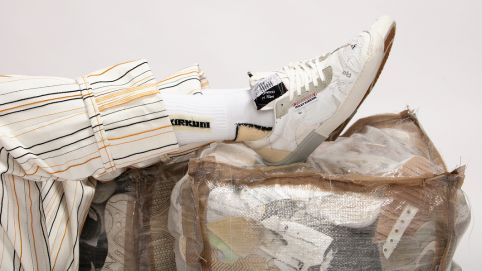
Learning the craft
“I hadn’t ever considered that footwear was a career path I could take,” she says. “But I did feel like a shoe incorporated both fashion and architecture into this perfectly formed product. I’ve never really looked back.“ Helen completed the University of Northampton’s footwear design BA, followed by the Royal College of Arts’ MA in footwear design. As her design and creative expertise grew, so did her awareness of the true impact fashion, and particularly footwear, can have on the environment. “Once I began to learn about the intricacies of footwear design: the range of materials used, the multi-layered creation processes and components, I realised why they’re notoriously difficult to recycle.”
The average shoe can use more than 30 different materials, many of which are stitched or glued together, adding additional hurdles when it comes to recycling. Mixing colours adds similar difficulties, with decorative metal studs and the use of metal shanks exponentially decreasing post-life recyclability, as these materials are hard to shred1. Helen wanted to provide a solution to this, so she began splicing together bits of Adidas with New Balance, bubble soles with thick canvas uppers to form entirely new items.
Not only do their shoes look fantastic, they’re also functional, comfortable and supreme in quality. This is, in part, thanks to Helen’s formal design education in Northampton, an area considered the home of British footwear. “We’ve brought the craft of shoemaking over to the brand as it’s a process that's at risk of dying in the UK.” Helen and her team offer a luxury-grade product that’s both an answer to fashion’s never-ending waste mountain, whilst creating shoes as they were originally made - slowly, and with care, thought and love.
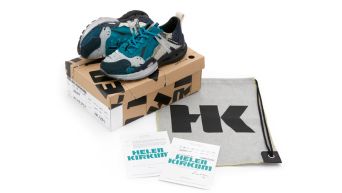
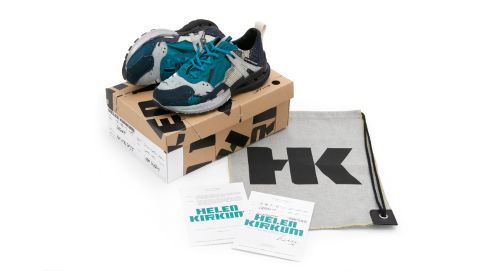
Impatient for change
Describing her brand as a place for ‘easy-going anarchists,’ Helen sees her customers as people who, like her, recognise that we have little opportunity or time left to save our planet. “Both myself and my customers are impatient for change, but also optimistic: we want to be a part of something revolutionary, but also buying into something that’s perfectly packaged and presented.”
The global fashion industry is responsible for more emissions than all international flights, maritime and shipping combined (between 2-8%)1. Its water consumption statistics are even more shocking – around 215 trillion litres of water are consumed by the industry each year2. “The word ‘sustainability’ can be so confusing”, Helen says. “It’s used throughout the industry, but it means everything and nothing at once. There’s no formal system of grading things. Sustainability should, in essence, cover issues such as worker’s rights, politics and biomaterials, but industry giants who don’t pay staff well and who use trillions of litres of water on new collections every month can continue to greenwash, as there’s no sanctioned system providing clarity for consumers.”
And that’s why Helen decided to focus on post-consumer waste - being a smaller, often forgotten area where she and her team continue to make real, tangible change. “I think for small brands, tackling one thing and doing it well is so important, and possibly easier for us than larger brands. Once we’ve become the best at that, we can move onto another area and tackle that in new ways.”

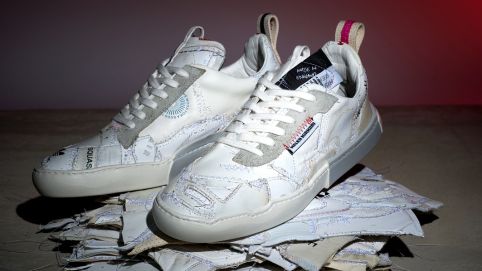
A wider influence
Helen hopes her brand's approach to producing more environmentally-friendly products will eventually influence the practices of larger brands, and also the conversations held around eco-conscious fashion. Running a truly sustainable brand means transforming every single aspect of production - from worker's pay and conditions to how many product lines are released per year, and where exactly products end up at the end of their 'lives'.
After launching the ‘Palimpsest’, her first ready-to-wear product in September 2022, Helen’s business has gone from strength to strength. “Before launching, our business was built entirely on bespoke orders for individual clients, which was less regular. But a ready-to-wear shoe from us is not the most straightforward process. Making new shoes from old shoes isn’t easy due to the range of materials we need, and I’m really strict with the factories and people we work with, so it took time.”
After finding small production factories in London aligning with her values and Forever, an eco-conscious shoe-sole producer in Portugal, Helen’s vision became a reality. “Forever is an incredible company. They have this amazing material made entirely from their own post-factory waste “
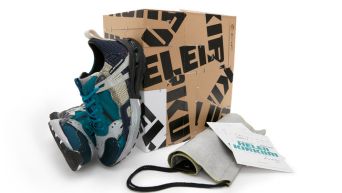
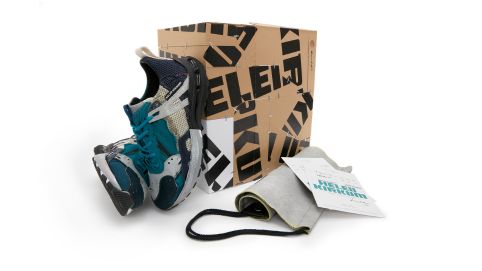
A growing community
Helen hopes other brands will soon follow her lead: “Whilst there are so many incredible, exciting technologies in the eco-friendly world, especially in fashion; for the next, say, 15 years, shoes are going to continue to be made the way they currently are. And that’s me being optimistic!” But Helen is still hopeful. “I think that’s why it’s so important brands start thinking about post-consumer waste. It’s a really exciting area to work in, especially with trainers, as it’s such a valuable and effective resource whilst helping create completely new footwear that people who may not care as much about sustainability still want to buy.”
By being honest and open across the brand’s social channels and website, Helen Kirkum Studio has helped forge a community of sneaker lovers re-evaluating their priorities and desires. “It’s just as important to us that we form a community of people who feel like they can make a difference. We get lots of people reaching out to us saying ‘Instead of throwing my shoes away, I decided to cut them up and create something new, because of you guys.’ I think that’s as much of a win for our studio as somebody buying our shoes.”
What’s one piece of advice Helen can give to those of us who aren’t as handy with a pair of scissors or a needle and thread? “When recycling old shoes, make sure to tie the laces of each pair together tightly, so they can be kept together. When I first went to a small recycling centre, they had 150 tonnes of single shoes!”
Check out Helen Kirkum’s range of ready-to-wear and bespoke shoes at https://www.helenkirkum.com/
It’s time to stop ignoring the climate crisis and act. At E.ON, we’re committed to helping our customers to tackle the climate crisis, not one day but today. Join us in the fight against the climate crisis.
1. Better Shoes Foundation: Post-Consumer Life
2. The Guardian: Fashion brands grapple with green-washing
3. Ibid.